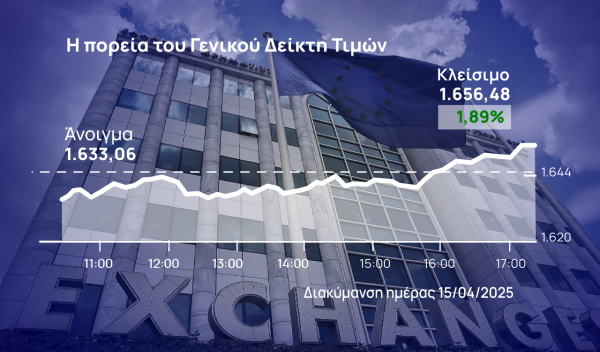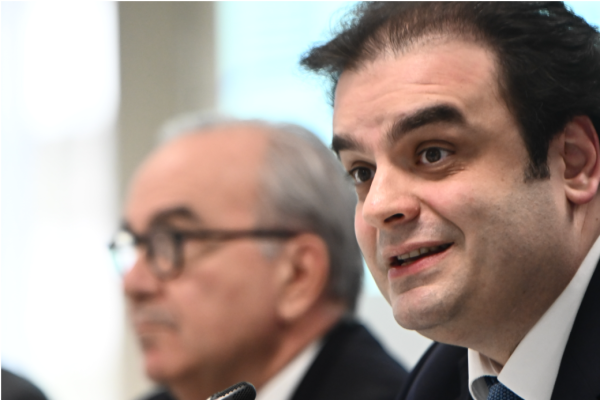
The eyes of the international investment community will be on Athens, where the meeting of the ECB’s board of directors is being held today for the first time in 15 years.
In the best-case scenario, central bankers, under the host of the whole organization, Giannis Stournaras, will decide to end the current cycle of monetary policy tightening, keeping interest rates unchanged, after 10 consecutive increases of a total of 450 basis points, since July 2022.
It is recalled that during this period the deposit acceptance facility rate has risen from -0.50% to 4%.
This development is considered highly probable, after the greater than expected slowdown of the consumer price index in September, the significant rise in yields on European bonds, but also the increased risks for the European economy after the outbreak of the crisis in the Middle East.
The question, of course, is whether the brake will be temporary or whether the process of reducing borrowing costs in the euro area will begin sometime in 2024.
In a recent interview, the governor of the Bank of Greece emphasized, among other things, that the ECB should not overdo it with interest rates, as there are serious risks for the economy.
He also estimated that if inflation is further reduced in the coming months, the relaxation of monetary policy could start from the middle of 2024.
In this context, the press conference that will be given this afternoon by the head of the ECB Christine Lagarde, who will refer to the rationale of the decision that will be taken by the Board of the Eurobank, is eagerly awaited.
However, it is not certain that it will provide any guidance for the next moves on the interest rate front.
And this is because the environment is complex. On the one hand, the increase in energy prices is likely to slow down the speed of inflation de-escalation, but on the other hand geopolitical risks cannot be ruled out leading to a contraction of economic activity.
Possibly, better visibility will be available at the meeting scheduled for December 14 in Frankfurt, as it will be preceded by the publication of the ECB’s updated estimates of the path of the economy.
Greek banks
For the Greek banks, however, the rise in interest rates to date has contributed decisively to the strengthening of their organic and net profitability.
Most of their loan portfolio is floating rate, linked to European interbank indices. As a result, the increase in installments, and therefore interest income, happened almost automatically.
On the other hand, revisions to deposit yields were sub-multiples.
Demand accounts are mostly interest-free or offer interest rates a few basis points above 0%, while the transfer of liquidity from savers to the more expensive term deposits remains extremely slow to date.
In this context, net interest income recorded an impressive annual increase of 60% in the first half of 2023, while, according to analysts’ estimates, the performance of the third quarter, which will be announced in the first ten days, will also be excellent of November.
At the same time, there are no tendencies to create new bad debts, due to the rise in borrowing costs, allowing banks to keep the cost of credit risk at reasonable levels.
On the other hand, the demand for new loans has decreased, despite the reductions in banks’ profit margins, in the direction of containing the final cost of the financial tools they have.
At the same time, the premature repayment of green exposures by borrowers with sufficient liquidity, who in this way reduce their debt servicing costs, after successive increases in interest rates, is a concern.
In the event that there are new upward adjustments, it is possible that these trends will strengthen again.
Latest News

Athens to Return Confiscated License Plates Ahead of Easter Holiday
Cases involving court orders will also be excluded from this measure.

Servicers: How More Properties Could Enter the Greek Market
Buying or renting a home is out of reach for many in Greece. Servicers propose faster processes and incentives to boost property supply and ease the housing crisis.

Greek Easter 2025: Price Hikes on Lamb, Eggs & Sweets
According to the Greek Consumers’ Institute, hosting an Easter dinner for eight now costs approximately €361.95 — an increase of €11 compared to 2024.

FM Gerapetritis Calls for Unified EU Response to Global Crises at EU Council
"Europe is navigating through unprecedented crises — wars, humanitarian disasters, climate emergencies," he stated.

Holy Week Store Hours in Greece
Retail stores across Greece are now operating on extended holiday hours for Holy Week, following their Sunday opening on April 13. The move aims to accommodate consumers ahead of Easter, but merchants remain cautious amid sluggish market activity.

Green Getaway Ideas for Easter 2025 in Greece
Celebrate Easter 2025 in Greece the sustainable way with eco-farms, car-free islands, and family-friendly getaways rooted in nature and tradition.

Civil Protection Minister Details Summer Firefighting Plans at Delphi Forum
At the 10th Delphi Economic Forum, Minister of Climate Crisis and Civil Protection Yiannis Kefalogiannis discussed Greece's plans for the upcoming fire season.

How Shops and Markets Will Operate During Easter Holy Week
The Easter holiday schedule has been in effect since April 10, with retail stores open Palm Sunday, and most supermarkets also operating to meet consumer demand for Easter shopping

Why Is the French Aircraft Carrier Charles De Gaulle in Piraeus?
Docking in Piraeus after a four-month deployment in the Indo-Pacific region, the admiral of the aircraft carrier the Charles de Gaulle says, "Greece is our best partner in the Mediterranean."

Riots and Vandalism in Downtown Athens Exarcheia Region
Night of unrest in downtown Athens' region of Exarcheia – 11 Cars Burned, 72 Detentions









































 Αριθμός Πιστοποίησης
Αριθμός Πιστοποίησης